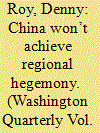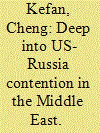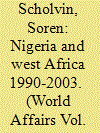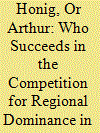| Srl | Item |
| 1 |
ID:
172088


|
|
|
| 2 |
ID:
161993


|
|
|
| 3 |
ID:
129934


|
|
|
|
|
| Publication |
2014.
|
| Summary/Abstract |
Sören Scholvin sheds light on Nigeria as a regional power from 1990 to 2003, a time marked by the country's numerous security interventions in West Africa. The main finding is that while Nigeria demonstrated its regional dominance, realised some specific objectives and mostly kept external powers out of the area, it failed to gain broadbased support from neighbours as it often acted unilaterally.
|
|
|
|
|
|
|
|
|
|
|
|
|
|
|
|
| 4 |
ID:
131881


|
|
|
| 5 |
ID:
177513


|
|
|
|
|
| Summary/Abstract |
Since the end of World War II, several local actors have tried to gain regional dominance in the Middle East. These attempts have met with varying levels of success. This study seeks to explain this variation. We will not address the equally important question of when and why specific states decide to make bids for regional dominance. We maintain that while realism is a useful theoretical lens for explaining this variation, it is necessary to adjust some realist assumptions slightly to make realism work well in the Middle Eastern context. This is so because realism was developed based on modern European and American experiences. Specifically, our adjustments of realism's assumptions produced the following three preconditions that must be met for a local actor's bid to succeed. First, one must pursue those types of power which are the most potent at a specific time given the Middle Eastern environment. Second, while traditional realists recommend forging large coalitions by reducing threat perception and making bargains through traditional diplomacy or Realpolitik, we argue that domination through subversion or intimidation is more effective. Third, one must not only avoid counterproductive intervention by the great powers, but also have them actively on one's side.
|
|
|
|
|
|
|
|
|
|
|
|
|
|
|
|